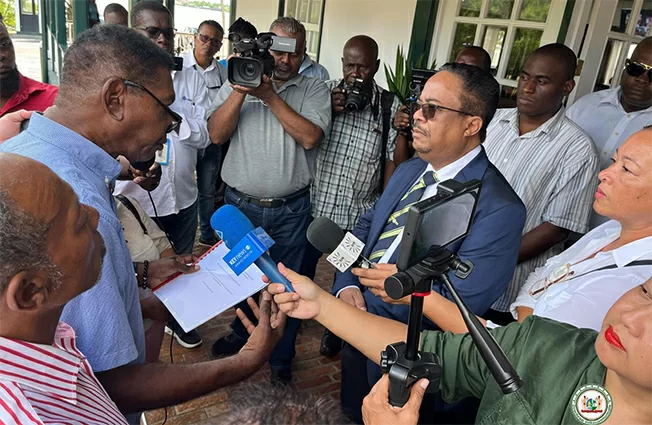The Committee for Reparations of Suriname’s Slavery Past has formally submitted a petition to the Surinamese government, urging structured dialogue on recognition, apologies, and reparations. Acting President Gregory Rusland received the petition at the Vice President’s Office on Wednesday. The move comes ahead of the state visit of King Willem-Alexander and Queen Máxima of the Netherlands, scheduled for December 1–3, 2025. The petition, supported by descendants of enslaved Africans and Indigenous communities, calls for immediate action to address the unresolved legacy of Dutch colonialism and slavery. It emphasizes the need for a unified approach to material and immaterial reparations, aligned with the CARICOM Ten-Point Plan and international frameworks such as the 2001 UN Durban Declaration and the 2005 UN Basic Principles on Reparations. The committee stresses that reparations extend beyond financial compensation, encompassing restitution, rehabilitation, truth-seeking, guarantees of non-repetition, and the structural development of affected communities. It criticizes the lack of concrete measures following apologies issued by the Dutch government and monarchy in recent years. The petition requests that descendants and Indigenous representatives be included in the official committee preparing for the royal visit. It also seeks a formal dialogue with the King during the visit, including a public moment where he reiterates his 2023 apology in Suriname and outlines a path toward reparations. Acting President Rusland expressed full understanding of the committee’s efforts, calling the issue ‘of great importance’ and promising to discuss the petition with President Jennifer Simons upon her return. The petition follows meetings on October 11 and November 1, 2025, where the committee drafted a reparations program and agreed to speak ‘with one voice’ to stakeholders. It highlights the inadequacy of apologies without reparations and calls for measurable actions to improve the lives of affected communities. The committee also urges recognition from sectors and institutions that have yet to acknowledge their historical roles, such as shipping companies, insurers, universities, and families. It references international and regional processes, including CARICOM, the African Union, and the UN Decade for People of African Descent, as guiding frameworks for justice and development.
